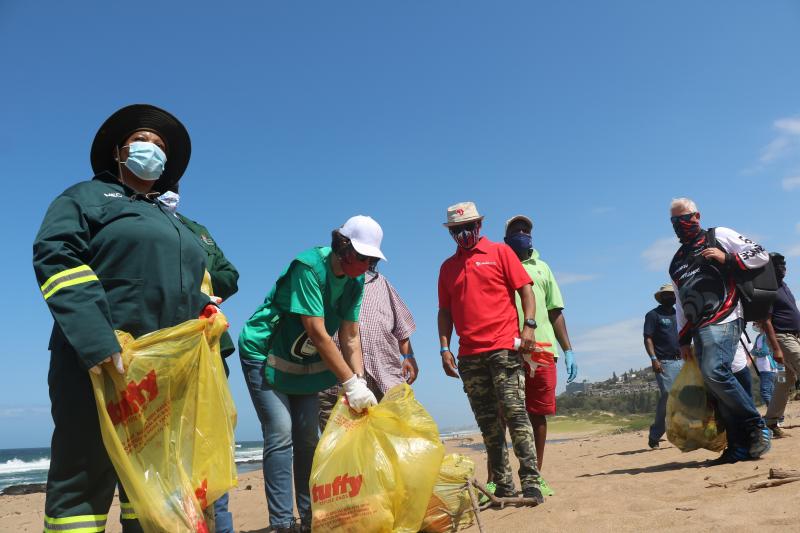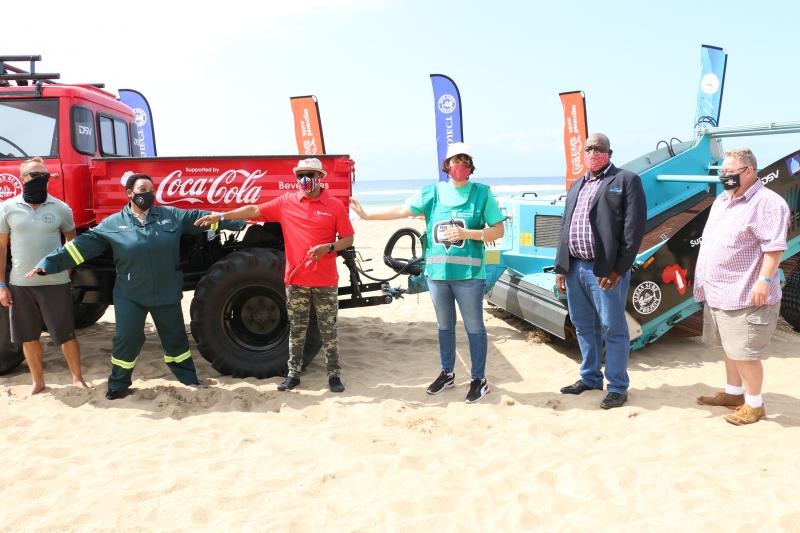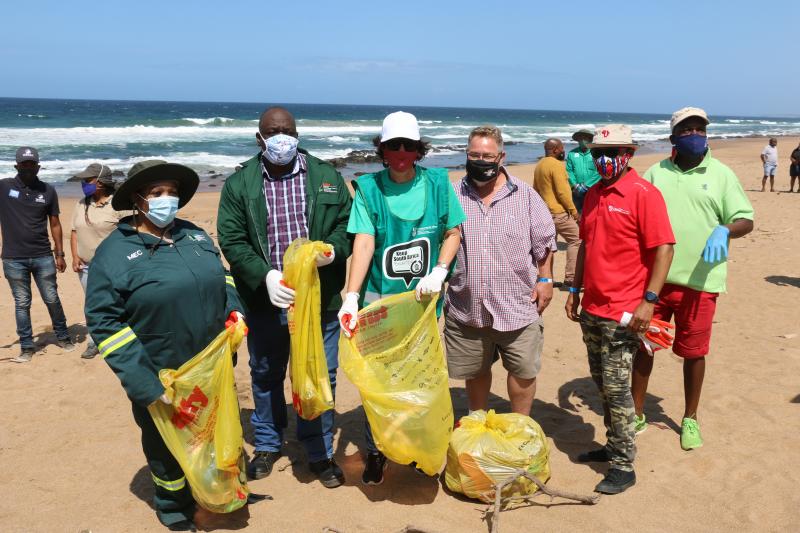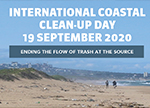International Coastal Clean-Up Day
Background
Annually, on the third Saturday of September, volunteers around the world take part in the world’s biggest coastal clean-up – the International Coastal Clean-up Day (ICCD). The event has been held internationally each year since 1986, when people head to the beaches and begin removing debris and rubbish from shorelines, waterways, and the oceans. The ICC initiative worldwide remains the largest volunteer environmental data-gathering effort and clean-up event of coastal and underwater areas to date.
South Africa has over 3000 km of coastline and some of the most diverse marine environments of the world. The benefits derived from the oceans include: climate regulation, waste absorption, sustenance (sea food), economic development (tourism, seafood distribution), transportation (shipping), medicine (biomedical products from marine plants and animals) and recreation (swimming, diving etc.). In addition to this, estuaries are considered to be sensitive environments, due to its ecological uniqueness and are increasingly being regarded as important ecological infrastructure to protect and enhance given the ecological services that it provides. Estuaries represent systems on the land-ocean interface where rivers meet the sea and it is typically in these systems where the problem of marine litter is seen to manifest itself so clearly and profoundly.
Due to human activities along estuaries and beaches (due to increasing population and urbanisation), marine litter creates one of the major threats to our beaches and marine life. Every year thousands of tons of marine litter finds its way onto our coast, most of which ends up in our oceans with devastating effects to our sensitive marine ecosystem. All kinds of trash, from cans to fishing gear, are dumped on our beaches. Eighty percent (80%) of all marine pollution originates from sources on land. Marine litter is one of the sources of pollution that threatens our marine life and ocean’s resources upon which we depend. A 2013 study conducted by the University of KwaZulu-Natal reported that 70% of small fish caught from the estuaries and Durban harbour in eThekwini showed evidence of plastic litter in their gut.
Plastics SA, the umbrella organisation that promotes recycling initiatives within the plastics sector, and which coordinates the South African volunteer-based International Coastal Clean-up initiative in partnership with the Oceans Conservancy, has reported that over one million pounds of marine litter are collected from South African beaches every year. During the 2019 ICC Day, a total of 16 795 volunteers from all walks of life participated in coastal clean-up activities across the country. The Department has also established a trend of hosting coastal clean-up events annually as part of ICC Day. During the 2020 ICC Day celebrations, the Department intends to focus on cleaning 4 sites within the eThekwini metropolitan area. It has been evident that marine litter comes from a variety of land-based sources and can well be generated kilometres upstream from the coast. Often these up-stream sources are not aware of the fate of their waste. Of note, 24% of the country does not have sanitation and waste management service provisions.
The top ten debris items recorded through the International coastal clean-ups are: cigarette butts, plastic food wrappers, plastic beverage bottles, plastic bottle caps, straws and stirrers, plastic grocery bags, glass beverage bottles, other plastic bags, paper bags and beverage cans. Since South Africa has begun participating in the ICC event more than two decades ao, there has been broad community involvement from schools and tertiary institutions, businesses, families, Service Clubs, Youth Clubs, Wildlife and Environment Clubs, National and Provincial Government Departments, media, Community Based Organisations, Non-Government Organisations, local municipalities and traditional authorities.
Launch of Inkwazi Isu Project
As a response to the escalating global plastic pollution problem, a group of responsible corporate citizens partnered with civil society, local NGOs and government to address waste management challenges within the KZN South Coast Basin. A baseline study of the region was conducted by the South African Healthcare Foundation (SAHF), to map out and ascertain the root causes of pollution in the environment. The selected project area is ideal for a pilot programme given its economic viability in tourism and the ecological dynamics of important rivers that flow into the Indian ocean at vantage points.
Inkwazi Isu project is a collaboration between various stakeholders aiming to holistically address the pollution problem in the area including the coastline and between the Ezimbokodweni River and Little Amanzimtoti River with the focus being on the Amanzimtoti River and close-by surroundings. Major role players from Industry, Local Government and Civil Society are putting together a comprehensive and consolidated plan to meet the challenge through improving Recycling Infrastructure and Education, which will address the overwhelming problems caused by poor waste management practices. The Inkwazi Isu project has received international interest and support from the Global Alliance to End Plastic Waste (AEPW) through a similar initiative existing at national level that is spearheaded by Plastics SA.
In support of the Inkwazi Isu project, Sasol has released a Baseline Assessment Study to understand the challenges around waste pollution affecting the KwaZulu-Natal (KZN) South Coast, specifically targeting the Amanzimtoti and Umbogintwini rivers. The Umbogintwini and Amanzimtoti rivers are the two main rivers that flow directly into the Indian Ocean south of the City of Durban. Both rivers are critical to the local economy and tourism industry. Several informal settlements exist next to the rivers and due to inadequate waste management, pollution is carried downstream, introducing waste not only beaches but also into the Indian Ocean. Although the waste is generic, plastic waste has become one of the more visible challenges in the area. Generally, roughly 80% of all litter that reaches our coastal waters is composed of plastic material.
The Baseline Assessment Report contains details of the study that was conducted to explore various project area parameters, ascertain the root cause of plastic pollution in the area, identify potential role players, properly state the main problems, and if possible, recommend solution-based priority actions. The baseline study focused on four broad areas which were considered as the main contributors to the plastic waste pollution cycle within the study area:
- Current state and effectiveness of waste management in the communities
- Environmental Education/Awareness within schools and amongst communities
- State of Clean-ups and the general public’s contribution to them.
- Potential for end of pipe Solutions such as litter booms and traps in various locations along rivers.
Local stakeholders were included to participate in the baseline study and assisted by interacting with local communities to extract the required information. This baseline team consisted of the SAHF, the eThekwini Municipality, Sapphire Coast Tourism, MMKH Recycling (a local recycler), The Clean Surf Project, Social Waste Management SA (a local Buy back centre) and the Toti Conservancy Forum.
This year, PlasticSA has planned to commemorate the ICC day and will use the campaign to provide an opportunity to promote and launch the Inkwazi Isu project through clean-up activities in the Amanzimtoti, South Coast of Durban. The Unimog and beach rake combo which is an innovative beach cleaning machinery will be unveiled at the launch and all stakeholders will launch a massive clean-up campaign on the Amanzimtoti beach to sensitize the beneficiary community. Plastics SA, has extended the invite to the Minister of Environment, Forestry, and Fisheries to take part in the launch and the clean-up on 19 September 2020 in Durban.
The department will once again lead various clean-up activities on Saturday, 19 September 2019, in Kwazulu Natal Province. The focus areas for clean-up will include; Durban Harbour, South Beach, The Mangroves, and Blue lagoon beach. The ICC event is used as a platform to address issues concerning coastal pollution as well as to stimulate change in the behavioural patterns that negatively affect the marine environment. The event will also empower communities to take ownership of their coastal environment for all the services it provides.
The department hosted various clean-up activities in Kwazulu Natal Province including Durban Harbour, South Beach, The Mangroves, and Blue Lagoon beach.
The participants will consist of local volunteers, NGO’s, and communities coordinated by eThekwini municipality and government officials. Some officials from the Department including the Minister will participate in the clean-up and formal programme led by PlasticSA at Amanzimtoti. PlasticSA will coordinate the formal programme and clean-up activities taking place at Amanzimtoti and the surrounding areas.
2020 Clean-up and Recycle SA Week
Clean-up and Recycle SA Week takes place this year from 14 - 19 September 2020, with various clean-ups being planned for neighbourhoods, water sources and beaches around the country. One of the highlights of this annual environmental awareness event, will be the International Coastal Clean-Up that will take place on Saturday, 19 September 2020.
Video and Images
Keynote address by Minister Creecy at the 2020 International Coastal Clean-Up event and the launch of Inkwazi Isu Project
The Department of Environment, Forestry and Fisheries acknowledges growing attention being placed on the problem of plastic pollution, and the effort that is being taken by the private sector, government, civil society and academia to address waste management in the country. As you know, plastic has been around since the 1950s and its versatility has ensured its use in almost every aspect of modern life. The proliferation of plastic products has been attributed to the material being water-proof, durable, versatile and cheap.
Speech
Minister Creecy to lead International Coastal Clean-up day activities in Amanzimtoti, Durban
The Minister of Environment, Forestry and Fisheries, Barbara Creecy will lead International Coastal Clean-up Day (ICCD) activities, under the slogan; “Ending the flow of trash at the source,” in Amanzimtoti, Durban, on 19 September 2020.





